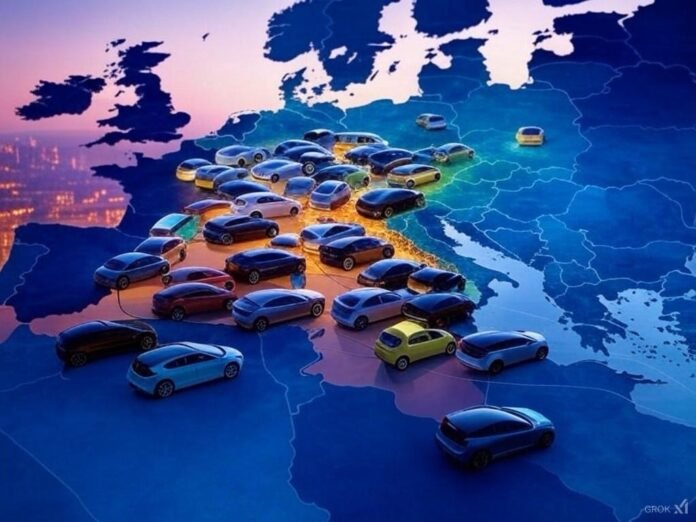The United Kingdom is charging forward in its pursuit to dominate the European electric vehicle (EV) market, challenging Germany for the top spot. In 2024, the UK achieved a record-breaking 21% increase in EV sales, with 382,000 units sold, surpassing Germany’s total of 347,048 units. While this surge is a significant milestone in the nation’s green transition, it has not been without challenges, as the UK fell just short of its 22% EV sales quota, achieving 19.6%.
Driving Growth in the UK EV Market
The impressive growth in EV sales can largely be attributed to aggressive market incentives offered by carmakers. A massive £4.5 billion in discounts helped lure buyers into the EV market, underscoring the industry’s commitment to meeting zero-emission vehicle (ZEV) mandates. These regulations, implemented by the UK government, require an increasing percentage of new car sales to be electric. The target begins at 22% in 2024 and escalates to an ambitious 80% by 2030, aligning with the country’s climate change goals and commitments to reducing greenhouse gas emissions.
In addition to financial incentives, the expansion of EV charging infrastructure has also played a key role. Cities and rural areas alike have seen increased investment in charging stations, with a particular focus on fast-charging facilities to alleviate “range anxiety” among drivers. As of late 2024, the UK has one of the fastest-growing networks of public and private EV chargers in Europe, solidifying its appeal to potential EV buyers.
Challenges Looming on the Horizon
Despite these achievements, the UK automotive industry faces considerable headwinds. Complying with the ZEV mandate has become increasingly costly for manufacturers. With targets set high and EV development costs still significant, automakers have been forced to offer substantial discounts to boost sales. For many, this strategy is unsustainable in the long term.
Furthermore, manufacturers that fail to meet the required sales thresholds must purchase ZEV credits or risk heavy financial penalties. This regulatory framework has drawn criticism, with industry leaders arguing that the rules place undue pressure on carmakers, especially smaller firms with limited resources. Some have even called for revisions to the ZEV mandate, suggesting a more gradual approach to allow the market and infrastructure to mature.
The Bigger Picture: UK vs. Germany
The UK’s emergence as a strong contender in Europe’s EV market signals a shift in global automotive dynamics. For years, Germany has been synonymous with car manufacturing excellence, thanks to brands like Volkswagen, BMW, and Mercedes-Benz. However, the UK’s recent EV growth suggests that its auto industry is adapting rapidly to a changing landscape.
Part of this success can be attributed to government policies that prioritize clean energy initiatives. Subsidies for both manufacturers and buyers, combined with stringent emissions regulations, have created a conducive environment for EV adoption. At the same time, Germany’s lead is narrowing due to supply chain disruptions and a more cautious pace in rolling out EV incentives.
Future Prospects
As the UK accelerates toward its 2030 EV mandate, the road ahead will require strategic investments and continued collaboration between policymakers and industry stakeholders. Expanding battery production, boosting research and development, and ensuring the resilience of supply chains will be crucial for the UK to maintain its upward trajectory.
Moreover, the success of the EV industry will play a critical role in the broader UK economy. Beyond reducing emissions, it creates jobs in manufacturing, research, and infrastructure development, contributing to sustainable economic growth.
With a competitive edge in innovation and increasing consumer adoption, the UK’s ambitions in the EV market could redefine its position on the global stage. While challenges remain, its progress thus far shows that it is well on its way to becoming a leader in the clean energy revolution.


